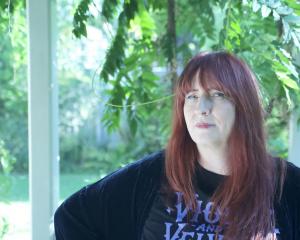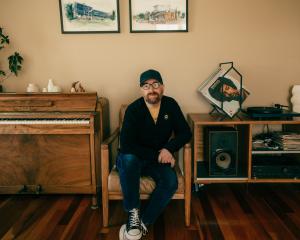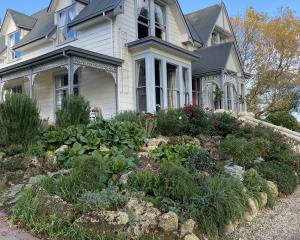
The sick and dying are cheek by jowl, but Liesel’s heart has gone out to the young girl Carol.
She returns to her bedside to provide whatever comfort she can, in the final chapter of Penelope Todd’s short story...
After eating lunch in the fresh air of the verandah, as stipulated by Matron, Liesel found a heavy coat and took a walk along the island's brow. The storm was being broken up by apertures of blue sky and sun that melted the last of the snow. Below, the waters of the harbour were brown, chopped and strewn with shreds of white. Brown bands of rain strode across the hills to the south. Reaching the trees, Liesel tore off a sprig of mottled pepper leaves. She crushed and inhaled its sharp, clean scent, and resolved to return early, in defiance of Matron, and sit again with the dying girl.
At the house, she tied a fresh apron in place, exchanged coat for cape, and picked her way up to the hospital on the track now turned to mud. With Matron mercifully absent from the diphtheria ward, Liesel pulled on a mask, and without glancing about - so that no dire need could make itself apparent - hurried to Carol's cotside, glad of the screen that kept other beds from view.
The child had sunk, if possible, more deeply into the mattress. Her eyelids didn't flicker as Liesel took her hand and kneaded its mauve fingertips. She breathed in quick puffing gasps, her nostrils flaring and flattening with each breath.
In Liesel's absence someone had renewed the chest poultice. She crouched and leaned into the warm, chemical aroma. "Carol, can you hear me? Your mama sends you her love. And soon she'll be able to come and see ...'' It was her own mother who came to her mind's eye, as she'd last seen her, hands to face and bent as the ship drew away from the dock. How little thought she'd given to her mother's pain. She vowed to finish the current letter that night, no matter how late she was dismissed from work.
She longed for her warmth and encouragement, as moans and fretful murmurs eddied about her, while the windows darkened as a band of rain swept across the island. There lay ahead of them weeks of grimness, of sick and dying children, and it seemed inevitable in spite of all their precautions that illness would yet spread through the quarantine station and into the ranks of the workers.

Nearby a man retched and wailed into a bucket and Susannah spoke soothing words. Liesel conjured up her own self at Carol's age, or a little older, on the sunny hillside above the estuary where she and her friend trailed cotton-reel trains full of summer holiday-makers down the sun-baked slopes to the mudflat beach. In a low voice she described the feathery yellow grasses, the chirp and flip of grasshoppers, crabs hurtling like shadows across the mud. And red-beaked gulls: one of which, mistaking it for a cockle, took Liesel's train engine up into the air and dropped it again and again on to the rocks. She and her friend had had to soothe and comfort the hysterical passengers watching from the beach as their honourable driver was dashed with his engine to certain ...
"Down to the mud,'' she concluded, with the amendment, "Ah, but by a miracle, he lived.''
A husky bleat came from the cot: "Maaaa''. Carol's eyes flicked open.
Liesel jumped to her feet. "Matron!'' she called out into the ward, and then she stepped away from the cot. Dora came from the dispensary to ask what she wanted.
"I'm sorry, I think she might have ...'' Liesel returned to the bedside. There already hung over Carol that unmistakable air of extinguishment. "I'm sorry,'' she said again, sick with her own cowardice. "I was frightened.''
In Dora's face sympathy and impatience struggled. "I'm sorry, too, nurse. Wrap the sheet about her and call for Gregor to take her to the workshed - they've set up a platform - just for now. Say a prayer for her, and as soon as you've told Matron, find another task. The living need us, it's the only way.''
With the slim white parcel pinned and labelled (should it be addressed to God, a gift returned?) she found Matron and asked her to be sure and let Carol's mother know that she'd died without distress, and (since it seemed a plausible reconstruction of that final syllable) breathing her mam's name. Then Liesel asked the wardsmaid to strip and remake the cot so they could give it to a woman currently incommoded on an even narrower stretcher.
For the next little while, she flayed herself inwardly. Instead of reiterating to Carol her mother's devotion, she'd been distracting herself, as the child lay dying, with her own reveries. But soon enough another patient's real distress became more pressing than her own abstraction.
And so it went that day, and the next, and for many days following. Liesel went around her allotted patients, helping them to use bed pans and vomit bowls; washing bodies or parts of bodies that were strained and stained by emesis, dysentery, spitting, bleeds and leaks. She marvelled at how many fluids a person managed in the normal course of things to contain, by skin, vessels, viscera, and health or good manners. In their delirium some of the patients treated the floor like the sputum mugs the nurses were forever pressing on them with the injunction to catch and cover their expectorations. Recalling that not so long ago she hadn't known the meaning of the word either, Liesel spoke instead of coughing and hoiking so there could be no mistaking.
There were always poultices to be reapplied; inhalations, swabs, gargles, sips or sustenance to be offered; linen to be sponged or changed; mugs and bowls and buckets to be taken away, emptied, scrubbed, sterilised and replaced; cries to answer; floors, tables, brows and chins to be wiped. Buckets of carbolic acid were kept standing open in the sluicing room so that the nurses could take it by the jugful.
At last one morning, after a spate of burials, including nurse Margaret's, when blue hyacinths were nosing up through the trackside grass, Matron announced that there would be no more deaths from diphtheria; and there were not. In the ward each day, heads were newly raised from pillows and gaunt bodies separated themselves from mattresses. They sat up and stepped away from their beds and went about like humans again, although coughing still abraded the atmosphere of calm that was like the aftermath of a storm, its survivors dazed and wondering what of the flotsam strewn about them held any residual meaning.
Liesel joined in the efforts to raise the convalescents' morale. There was time at last to attend to matters of the body affecting more than mere survival. She cut knots and combed lice from children's heads, and washed and reshaped hair that had been shorn, or matted by weeks of neglect. She trimmed and filed toenails and fingernails, and massaged borax and glycerine into sheet-roughened elbows, knees and hips. She filled bathtubs behind screens and knelt to wash backs and feet. Here tightened faces relaxed, and sometimes grew wet as the press of warm water on thirsting skin drew, by some strange osmosis, answering tears. There was time to find clothing that fitted and sometimes even belonged to its wearers, to help those who wished it to shave, or to take a pipe or a slice of sun at the sheltered end of the porch. Later there would be shaky walks in the bright air, across the hilltop and down to the graveyard where grasses, leaves and paper flowers were pinned to wooden plaques, pathetic gifts pitched at the caverns of loss.
For a while Liesel wasn't sure she cared to be alive. Fifteen bodies had been sown in the hillside and nothing but shreds of couch-grass grew from the earth above them. Of the immigrants, their living shipmates grieved and yet gained strength in the vigorous climate, although few retained the same optimism for the new life in the colony with which they'd departed their homes. Kowhai flowers hung heavy over the track to the wharf as small, anxious groups were sailed away to the mainland. But sail away they did, until the last was gone, and over dinner that night Martha insisted that by this time next year, in fact before the end of summer, life would have taken on softer, warmer tones. It would seem worth going on with.
And towards that inevitable end, she announced, there was going to be a dance.
"A dance?'' Liesel voiced their incredulity.
"A dance.'' Martha mopped her chin with a floral napkin. "To farewell the dead, to welcome spring, to chase away for one night the strain and sadness I see on your faces. To make us laugh again.''
Liesel shivered a little inside. Was there really fun to be had, and could their careworn, motley island family learn to play again? True, there was a dress in her trunk she'd never yet worn, and a pair of slippers with soles unscuffed since she left the old country. She looked across the table and saw above her tight-set mouth an answering gleam in Susannah's eyes. They bent their heads and ate, apologetically.
University Book Shop short story series












